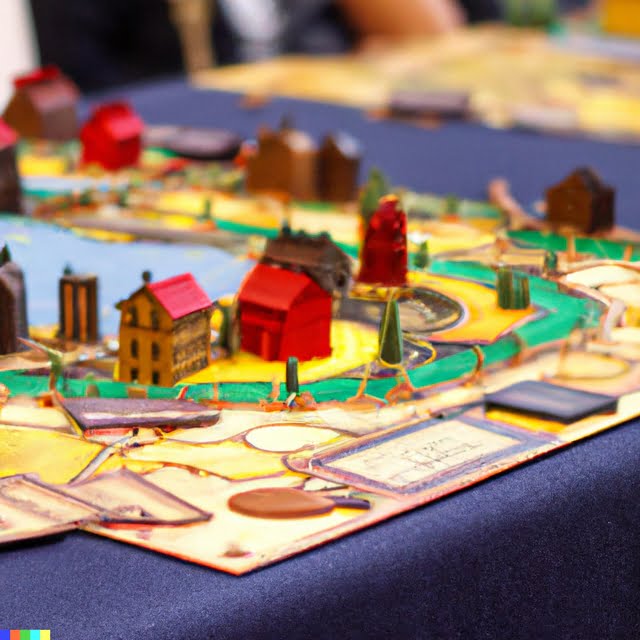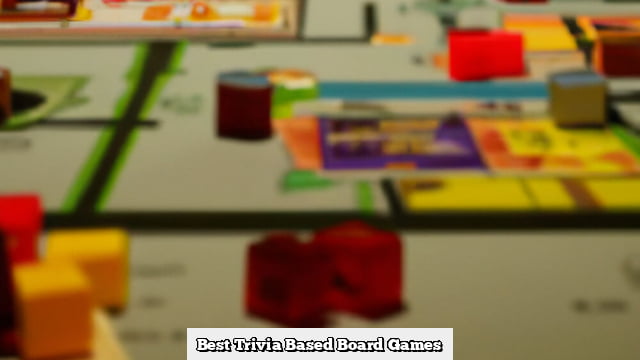Introduction
Board games have been around for centuries and bring people together for fun, competition and even education. A board game is any game which is played on a physical board or other surface. Board games are the oldest of all forms of recreational gaming, originating as far back as 3500 BC. Trivia refers to general knowledge facts and trivia-like questions usually associated with quizzes, nonfiction books and TV game shows.
Board games that focus on trivia will challenge players to test their knowledge while providing fun facts and an entertaining gameplay experience. Whether it’s classic pub trivia or tailored after a successful television show format, these games are designed to bring people together to learn and share knowledge with each other in an engaging way. Popular trivia examples include the ‘Jeopardy!’ series, ‘Who Wants To Be A Millionaire?’, ‘King Of The Hill’ and many others that have captured the attention of viewers around the globe. As with most board games, players must compete against each other in order gain points or prizes from answering given trivia questions correctly or faster than others.
Trivia within board games is not only a form of entertainment but also provides educational value for those playing by teaching new information about various topics such as world history, pop culture references, science inventions/innovations, movie plots etc. This can promote collaboration between opponents by sparking interactive conversations derived from shared knowledge and learned facts informing everyone’s understanding on the material being discussed. Additionally many versions can allow players to customize the topics discussed creating a more engaging atmosphere fitting to all ages while enabling them to further reinforce their expertise in particular areas they may specialize in like sports statistics or music composition/theory based questions.
All in all board game trivia is timeless form of recreation allowing family, friends and adversaries alike to come together regardless of age in order build bridges of collective wisdom through friendly competition all while enjoying quality time amongst one another leading towards greater things
A Brief History of Board Games
Board games have been around for thousands of years, traces of early board games in Egypt, India and China dating back to 3500 BC. The most famous being the Royal Game of Ur, a game believed to have originated in ancient Mesopotamia as far back as 2600 BC, which involved two players competing to be the first to move all their pieces around a board. In 1000 AD, chess is believed to have originated in India and quickly spread across Europe via trade routes before becoming the popular strategy game that it is today.
In the following centuries, other games such as Mancala and Backgammon also emerged with origins either being credited to Africa or the Middle East. Moving into modern times, more complex board games appeared in the 1800’s inspired by war actions such as ‘The War of 1812’ (1824). Later on during WW2 heavier exercises were made in order to simulate other war actions like ‘Tactics II’ (1938) which was designed by Charles S. Roberts who later would be acclaimed as ‘the Father of historical wargaming’. This type of game was taken into serious consideration by scientists and military experts so much that they made use of it in simulations.
On top of this rich history is where companies like Hasbro or Milton Bradley stepped up and released some classic titles like: Monopoly (1935), Scrabble (1948), Battleship (1967) among others well known today. With time authors from everywhere started making their own designs inspired by their culture and giving birth to a world wide collection of amazing masterpieces beloved by millions up until today with top sellers regularly coming from Germany or Japan. In short board games are here thanks to centuries long evolution taking them from simplistic mechanics used for education through exploring different cultures up until simulations for military training or just plain family fun times; needless to say; an iconic form of entertainment!
Types of Board Games
Board games have been around for centuries and come in many different types. Common types of board games are strategy games, educational games, party and family games, war-themed or combat games, mystery and detective games, card and dice based games, and many more. Strategy board games require the most strategic thinking, while educational board games focus on teaching players lessons such as language skills or problem solving. Party and family board games often require cooperation between all players to win, such as clues and team-building activities. War-themed or combat board games involve two or more armies competing against each other with a defensive/offensive design. Mystery and detective themed board games allow players to investigate by suggesting certain scenarios that must be investigated in order to solve a case. Lastly, card and dice based board games involve both luck and tactical skill in order to win the game.
Interesting Board Game Trivia Questions
1. What was the first commercially available board game?
The first commercially available board game was The Mansion of Happiness, sometimes referred to as Virtue Rewarded and released in 1843 by S.W. Allen and Co. It was an adaptation of a square-shaped Chinese fortune-telling game called Kon Ge Ki dated back to 16th century China in which players try to progress through life’s stages while learning the virtues they need to be successful. The publisher made some changes, including new rules and a moral lesson attached.
Unconventional Facts about Board Games
Board games are known and loved around the world for their ability to bring people of all ages and backgrounds together. Although the origin of board games date back centuries, their popularity has not wavered in the slightest. There are also some interesting pieces of trivia related to these beloved past-time activities that most players don’t know. Below are some fun and unconventional facts about board games:
• Monopoly was originally called The Landlord’s Game and was created as a way to show people how unfair the concepts behind renting property were.
• The average population of Scotland is 5 million, similar to the number of copies that have been sold of Exploding Kittens since it was released in 2015.
• During World War II, a diplomatic version of Risk was secretly sent by the American Office of Strategic Services (OSS) as propaganda material to Nazi-controlled countries in an attempt to turn citizens away from fascism.
• In 1993, Trivial Pursuit had its own special edition made for Vogue magazine that featured questions related exclusively to fashion, beauty, entertainment, and current events within the fashion industry.
• Taboo was inducted into the National Toy Hall of Fame in 2013 due largely to its reputation for being one of the first “party” games ever created.
One other fascinating fact about board games is that Milton Bradley’s iconic game “The Game Of Life” wasn’t actually invented by him; it predates his company by over 40 years! Originally named “The Checkered Game Of Life,” which later became simplified as just “Life,” it was first published in 1860 by W & S B Hasbro Games. Because Milton Bradley lacked experience manufacturing equipment necessary for production at scale, he decided instead to purchase already established games with an intent on rebranding them under his own moniker; thus began his highly successful venture into what we now know as modern board gaming!
Advantages of Playing Board Games
Playing board games has numerous advantages. Board games can provide countless hours of active entertainment, fill any gap in family time, and spark productive conversations that simultaneously educate and entertain.
Board games bring families together by creating a fun environment that encourages communication and engagement between everyone involved. Players often experience improved problem solving skills, creativity, collaboration skills and strategy-building as they move their pieces around the game board and think about their next moves. Board games can also help develop socializing skills such as how to be a gracious winner or loser, learning how to take turns, follow rules, and interact in a polite manner when playing with others.
Additionally, board games help kids sharpen reading skills as many require players to read cards or instructions. Games can also improve hand-eye coordination by requiring players to physically touch pieces and remove them from where they are placed on the game board. Many educational board games also introduce topics like geography, history, spelling or math depending on the age range at which they are targeted. By playing these types of educational board games children are not only having fun but reinforcing what they have learned in school which is particularly beneficial for younger children who may not retain knowledge beyond a single classroom session.
Famous Board Games Over Time
Throughout the years there have been numerous board games that have become household classics. These have included games such as Parcheesi, which was invented in India in the late 1500s and was brought over to England by a British Army Officer in the mid 1800s. The game of Monopoly was designed by Elizabeth Magie Phillips nearly a century later. She created the game to teach people about economics, and it eventually made its way around the world, becoming one of the most beloved games of all time. Another classic is Risk, created in France in 1957 with its main goal being to take over the world. It became an instant hit, challenging players to risk everything for victory. The 1960s saw another success in Britain ” Cluedo ” which played out like a detective mystery novel across a gaming board as players attempted to seek out “whodunit” through strategically implemented moves. More recently there have been massive mainstream Game of Thrones and Harry Potter themed boardgames which have been immensely popular among all age groups. All these famous board games are likely to remain favorites for many more generations to come.
Unusual Board Games from Around the World
Board games are a fun way for people of all ages to engage in play, develop *strategy skills, practice interpersonal relationships, and even make decisions about financial matters. Some board games date back centuries and have origins in ancient cultures. In more recent times, however, game creators have developed some odd and unusual board games from around the world.
One of these unusual board game creations is The Game of Life, which can be traced back to Japan during the Edo period (1600-1868). Players compete in a race to accumulate wealth while they go through different stages of life – from high school graduation to retirement. As they progress through each stage,different events take place that may either bring gain or loss. Rewards include material possessions including cars or pets.
Another unique international board game is called Pachisi. This strategy game originated in India over 2,500 years ago and has been played by Indian royalty since ancient times. It’s a fast-paced dice game for two to four players where players must traverse the board according to various symbols on their dice roll and beats their opponents accordingly. Although simple compared to contemporary board games with elaborate pieces and strategies, Pachisi has been popular throughout time thanks to its easy rules and engaging gameplay.
Camel Up is an Arabian-themed racing game featuring camels moving around a track shaped into a pyramid. Players bet on camel races and try to predict which one will cross the finish line first. While this game is quite complicated when it comes to making bets on multiple races at once, Camel Up provides stunning visual elements with small camels carved out of wood as well as graphic artwork depictions of desert oases which add great atmosphere for enthusiastic gaming sessions!
Tips on Organizing Your Own Board Game Night
Organizing your own board game night can be a great way to bond with friends and family and have some fun! Here’s some tips to get you started:
1. Choose the right location – Make sure there is enough room for everyone to comfortably play, as well as lots of fresh air. Ensure the area is well lit and clutter-free.
2. Pick out your games – Taking into account the ages and interests of the people participating, put together a selection of board games that are interesting and engaging.
3. Refreshments – Have snacks such as chips, crackers, and popcorn ready so people can refuel in between rounds! Combining this with drinks will provide additional fun and energy as well.
4. Set ground rules – Before you get started, set clear guidelines on what’s allowed during game-play (no cheating!) and clarify any house rules or special instructions related to the specific game that you are playing, if applicable.
5. Setting up teams – If you are having multiple people participate in each round, consider forming teams with mixed levels of expertise or competitive spirit to level out gameplay. And lastly, have fun!
To add a bit more atmosphere to your board game night, consider incorporating trivia about classic board games for added background knowledge or just for some extra entertainment between rounds! There are plenty of online sources available where players can test their knowledge on different titles like Monopoly or Clue and learn more about how these classic board games came to life in their formative years! For a bigger challenge, trivia could act as an elimination round prior to diving into an actual game where players can win or lose points depending on who has guessed correctly! In addition, keep track of results from previous games played at your board game nights – it could provide a competitive edge when playing against long time friends or family members!
Benefits of Acquiring Trivia Knowledge about Board Games
Board game trivia can be a fun way to increase general knowledge and engage in some friendly competition. Knowing board game trivia can also teach people about history, strategy, and the evolution of specific games. Acquiring trivia knowledge about board games can help improve communication skills as well. It’s an excellent way to get family members of different ages talking, engaging in lively discussions and having fun together. Whether you know it or not, discussing trivia questions exercises cognitive skills such as memory and understanding facts. This can lead to better performance in school and work environments. Additionally, playing a group game involving board game trivia is often a great way to build relationships with new friends or family members while at the same time learn something new.
Conclusion
Playing board game trivia can be highly beneficial for everyone involved. It is an excellent way to improve problem-solving skills, learn new facts, and enjoy time spent with friends and family. Board games are particularly useful in helping children learn by providing a fun and interactive method of learning. Not only will they get to practice their mental and physical skills while they play, but they’ll also get exposure to a variety of educational topics. Finally, adults can enjoy a much needed break from the digital world and connect with other human beings using the power of conversation. Whether you choose to play alone or with friends, board game trivia is sure to bring out your competitive side as you have fun learning about different topics in a social context.

I love playing all kinds of games – from classics like Monopoly to modern favourites like Ticket to Ride.
I created this blog as a way to share my love of board games with others, and provide information on the latest releases and news in the industry.





